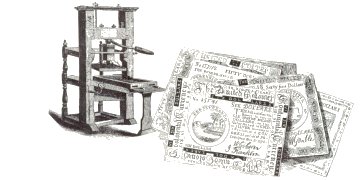Our invisible benefactor ...
Who Was Roger Sherman?
F. Tupper Saussy
"Roger Sherman was a man who never said a foolish thing in his life." - Thomas Jefferson
 |
The Framer who perfected the design of our country's monetary system was a man who had spent most of his life struggling with — and publicly condemning — a fluctuating medium of exchange. That man was Roger Sherman, a delegate to the Constitutional Convention from Connecticut and the only American to sign all four of our nation’s most significant foundational documents: the Continental Association of 1774, the Declaration of Independence, the Articles of Confederation, and the United States Constitution. Renowned for his high intelligence and unswerving honesty, Roger Sherman was described by John Adams as “honest as an angel, and as firm in the cause of American independence as Mount Atlas."
Contemporary verbal sketches depict him as a learned man, steeped in historical knowledge but immensely bashful due to his stammering speech and physical awkwardness. He was born in 1721 in Massachusetts and learned farming and shoemaking from his father. His formal education consisted of just a few years in his youth; he filled out the rest independently. He published almanacs based on his own astronomical calculations, and included both original and classical poetry. He operated his own general store. At the age of 31 he wrote a searing indictment of paper money, A Caveat Against Injustice: or, an Enquiry Into the Evil Consequences of a Fluctuating Medium of Exchange. In 1766, at the age of 45, Roger Sherman was elected Judge of the Superior Court in New Haven, Connecticut, serving that office with distinction until 1788.
 |
On August 28, 1787, Sherman and another convention delegate proposed that the states sacrifice the power to participate in paper money schemes. When it was counter-proposed that the states be allowed by Congress to make things other than gold and silver coin a tender in payment of debts, we're told by James Madison that Sherman exclaimed, "We are making these measures absolute. This is a favourable crisis for crushing paper money. If the consent of the Legislature could authorize emissions of it, the friends of paper money would make every exertion to get into the Legislature in order to license it." Sherman's motion unconditionally prohibiting any state from making “any Thing but gold and silver Coin a Tender in Payment of Debts” was quickly approved and became the Supreme Law of the Land.
In 1791 he was elected to the U.S. Senate where he served until his death in 1793. This quiet, humble, awkward man who farmed, educated himself, worked with his hands and his mind making shoes and poetry, making astronomical and economic calculations, making law and justice, is completely unknown to all but a handful of early American historians. Yet, if Judge Sherman hadn't stood up that hot August afternoon in Philadelphia and uttered Article I Section 10, America would have been an endless series of banana republics, regime after regime printing itself out of existence.
(This information is excerpted from the Foreword to the 1982 edition of Roger Sherman's A Caveat Against Injustice, and from The Miracle on Main Street, both written by F. Tupper Saussy. Used with permission.)
For a more comprehensive biography of Roger Sherman, click here.
FOR EXTRA ENRICHMENT:
Roger Sherman and the Creation of the American Republic — Professor Hall gracefully explains how one of the Founding Era's best politicians fully integrated his religious faith into a life of pragmatic and effective public service. This book is a must-read for anyone engaged in legal debates about the nature of the U.S. Constitution.
What Should Every American Know About Money? — What every American should know about the nature of coin, credit and circulation, as well as the Federal Reserve system, the Constitution, and specie.